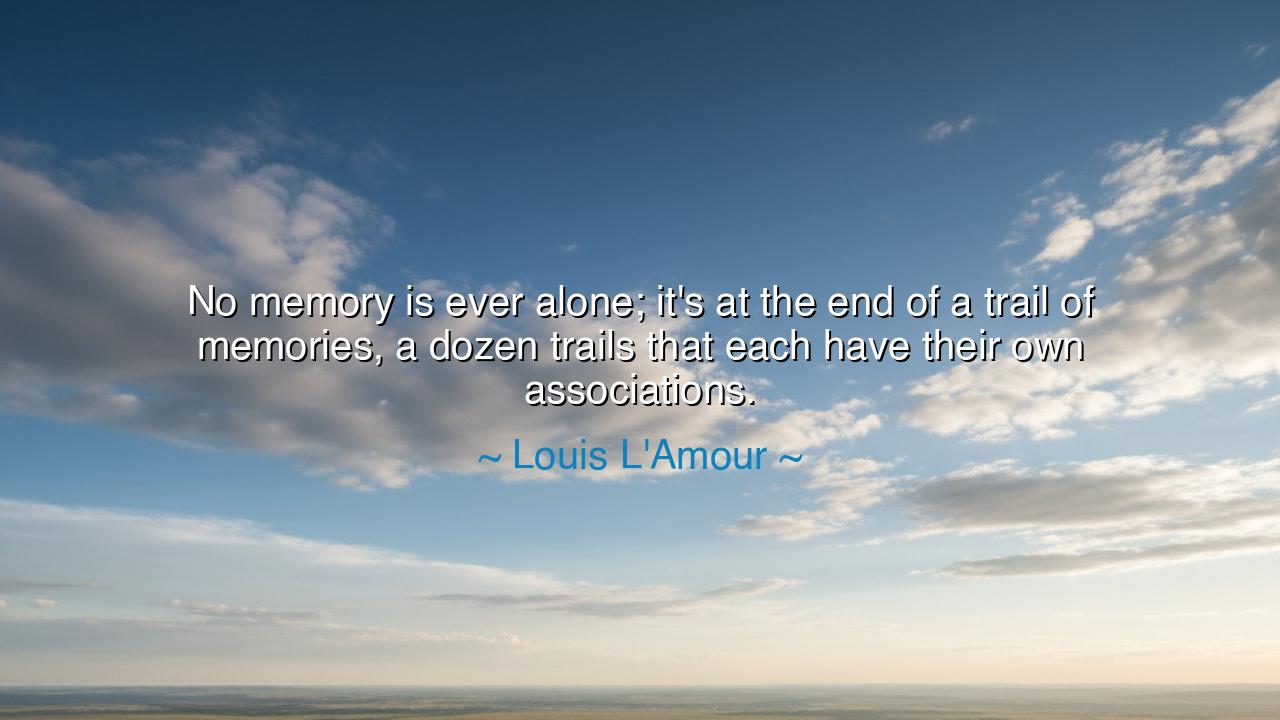
No memory is ever alone; it's at the end of a trail of memories
No memory is ever alone; it's at the end of a trail of memories, a dozen trails that each have their own associations.






"No memory is ever alone; it's at the end of a trail of memories, a dozen trails that each have their own associations." These evocative words by Louis L'Amour illuminate the profound interconnectedness of our memories. A single recollection, no matter how seemingly simple or isolated, is never an entity unto itself. Instead, it exists within a web of memories, each one entwined with others, forming a tapestry of experiences that shape who we are. L'Amour speaks to the complexity of memory—how one recollection can bring forth a dozen more, each with its own emotional significance, context, and association. In this sense, memory is not a static collection of isolated moments but a dynamic, ever-evolving network, woven together by the threads of time, experience, and emotion.
In the ancient world, the Greeks recognized the intricate and intertwined nature of memory in their mythologies and philosophy. Homer’s epics, The Iliad and The Odyssey, are filled with memories that lead characters back to past trials, joys, and losses. Each memory is a doorway, not to a single isolated event, but to a deeper understanding of the individual’s journey through life. When Odysseus recalls his time in Troy, it is not just the memory of war, but also the memory of his longing to return home, the suffering of those left behind, and the lessons learned from the gods themselves. These experiences are woven together, creating a complex network of associations that shape Odysseus' path forward. L'Amour echoes this understanding, pointing to the interconnectedness of all our memories, where one leads to another, and each shapes the way we perceive the world.
This idea of intertwined memories is further explored by the Stoic philosophers, especially Marcus Aurelius, who recognized the deep connection between past events and how they shape our thoughts and actions. In his Meditations, Aurelius frequently reflects on the impermanence of life and how memories, both good and bad, influence how we respond to the present. He understood that the trail of memories leads to greater wisdom when acknowledged and embraced, for each memory, when properly understood, offers an opportunity for growth and self-reflection. Aurelius, like L'Amour, teaches us that no memory stands alone—it is always connected to a larger journey, a journey that shapes who we are and how we move forward.
Consider the life of Mahatma Gandhi, whose memories of his experiences in South Africa and England shaped his philosophy of non-violence and self-reliance. Gandhi’s commitment to truth and peace was rooted not just in the memories of his own suffering and triumphs but also in the larger historical context of his country's struggles. Each memory of his life—whether it was his time in prison, his encounters with the British, or his deep spiritual practices—was intertwined with the broader story of India's independence. These memories did not exist in isolation but were part of a grander tapestry that defined his actions and his identity. Gandhi’s life demonstrates how memories, linked by experiences, struggles, and reflections, shape the choices we make and the legacy we leave behind.
The lesson in L'Amour’s words is profound: our memories are not isolated fragments but are part of a greater whole, a complex network that shapes our understanding of ourselves and the world around us. Memories are not merely recollections of the past but are threads in a fabric that we continually weave as we move through life. Each memory, no matter how small, is connected to a larger trail of experiences, and each trail holds the potential to lead us to new insights, understanding, and growth. This interconnectedness reminds us that our lives are shaped by a web of experiences, and that each moment we live adds to this web, whether we are aware of it or not.
In our own lives, we should approach memory not as a collection of isolated moments, but as a series of interwoven trails. Every experience we encounter, no matter how insignificant it may seem, is part of a larger narrative that defines us. We should take time to reflect on the connections between our memories, for doing so can reveal patterns, lessons, and insights that may otherwise remain hidden. Like Odysseus returning home after a long journey, we must acknowledge how each experience, each memory, brings us closer to understanding our true selves. By embracing the interconnectedness of our memories, we can learn to navigate the complexities of life with greater wisdom and clarity.
Let us then treasure our memories, not as isolated fragments, but as part of the intricate web of life that shapes who we are. Let us learn to reflect on the trails they create and understand how each memory contributes to the greater story of our existence. In doing so, we gain not only a deeper understanding of our past but also the wisdom to navigate the future. Each moment, each memory, is a stepping stone on the journey of becoming the person we are meant to be, and through reflection and awareness, we find meaning and purpose in the trail of memories that stretches behind us and ahead.






AAdministratorAdministrator
Welcome, honored guests. Please leave a comment, we will respond soon